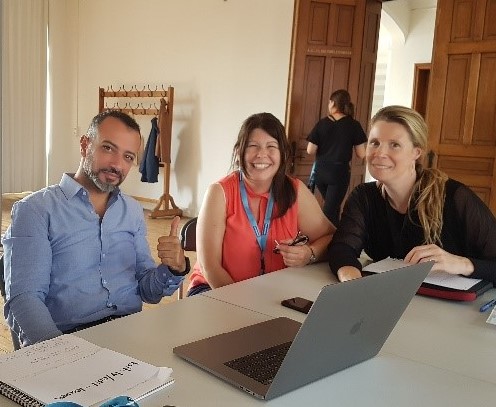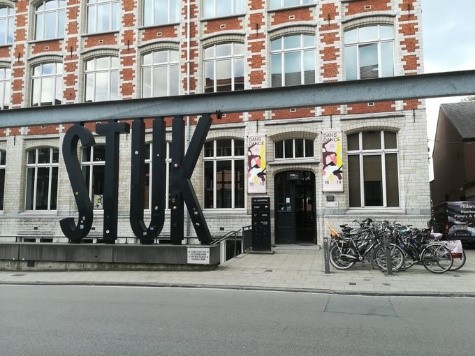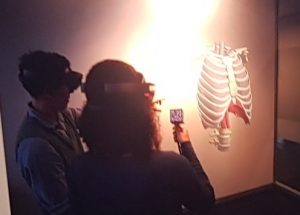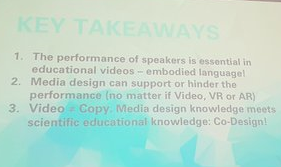
In May 2019 I was delighted to be awarded a bursary by UCISA to attend the Media and Learning Conference in Leuven, Belgium.
It was a very enjoyable and interesting conference; 283 delegates attended, from 22 countries, including many from Europe, Egypt and Australia
The theme for this year’s conference was Video in Higher Education, which, from my perspective, was perfect. I am employed at Queen Mary University of London (QMUL) as Learning Technologist, my specialism being video and multimedia! This was the second year that the conference focussed on this topic, demonstrating not just how much there is to discuss, but also how rapidly this area is developing within education.
As well as the opportunity to get to know other delegates at the welcome reception, two pre-conference workshops were available for those who were fortunate to reach Leuven the day before the conference began. So popular was the tour of the LIMEL media centre that it was sold out before I received confirmation of the bursary, but I did get a place on the EDIT workshop. EDIT is based on the concept of enabling students and their teachers to work together to achieve an end. At present 12 Universities from
11 countries participate in this annual challenge. For more information see: http://www.editvideochallenge.org/
I have to confess that, having spent many years in the video industry, I wasn’t expecting to enjoy this workshop as much as I did (perhaps a slight feeling of ‘been there, done that’ held me back?!). But the experience was enjoyable from start to finish – it was fantastic to meet some very talented colleagues from across the globe, great to participate, pooling our diverse collective skills and focussing on every aspect of the video, including the educational content of the video, the technical aspects of camera angles, lighting, continuity and working together as a group, which in itself can be a challenging but very worthwhile experience.
The annual EDIT workshop lasts 4 days, so the students and teachers have plenty of time to discuss and produce a video of up to 4 minutes duration. Our workshop lasted just four hours, during which we learnt all about EDIT and the success it’s enjoying across Europe. We then divided into three separate micro workshops on editing, shooting video and script writing.
I opted for the last and found it useful to learn more about how developing the right script can influence the pedagogic value and the teaching and learning sequence. We also discussed the value using recall and triggers in scripts as ways of reflecting and reviewing actions.
We discussed the importance of keeping in mind the educational aim, who the target audience is, who needs to learn from it.
Janne Lansitie from the EDIT video challenge team explained how 99% of scripts for video, film and plays use a dramaturgical model and story spikes to create interest; unexpected endings are a well used approach to keep the viewer hooked until the next episode. 
Another suggestion was to structure the storytelling to support the pedagogical script.
By the time we’d concluded these interesting micro workshops though we face the awesome challenge of thinking up, storyboarding, shooting and editing our 90 second masterpieces in just 45 minutes!
 By chance, and good fortune, the ice breaker games teamed me up to produce our EDIT video with James, from London Metropolitan University, also a UCISA bursary winner, of Nathalie from Leuven Uni and Ahmad from The American University in Cairo – a team that had all the necessary experience of education and technology to tackle the task.
By chance, and good fortune, the ice breaker games teamed me up to produce our EDIT video with James, from London Metropolitan University, also a UCISA bursary winner, of Nathalie from Leuven Uni and Ahmad from The American University in Cairo – a team that had all the necessary experience of education and technology to tackle the task.
The EDIT workshop rules stipulate that each group has to produce a video in which they incorporate 3 words, which are announced at the start of the activity. The words we had to include in our videos were: Watch, Time and Safe and the concept our group chose, after many an option, was to produce a warning about cyberbullying, showing a mum looking out for her child using the internet and playing online games.
3 words, which are announced at the start of the activity. The words we had to include in our videos were: Watch, Time and Safe and the concept our group chose, after many an option, was to produce a warning about cyberbullying, showing a mum looking out for her child using the internet and playing online games.
At the end of the workshop all participants were asked to vote on each of the videos produced – marks were awarded for:
- Educational value 1-10 points
- Technical merits 1-5 points
- Artistic quality 1-5 points
To the delight of all 4 participants, our group won! So UCISA, having two reps in the group, received double acclaim for this!
Our winning production can be viewed here
Conference Day 1
On my first day in Leuven the first delegate I met was Cesar, from Spain – discovering we were both heading to the conference we walked the steep Leuven hill together. We took the wrong route so had plenty of time to chat about what had brought us there. Meeting Cesar and others through the workshop and at our lodgings was a great ice breaker for attending the conference and it was lovely to make such good friends and contacts over the course of the week.
KU Leuven which hosted the event, is a massive university with some 60,000 plus students. It has 14 campuses across Belgium attended by over 20000 staff and nearly 58000 students.
The conference was held in the STUK, one of the main University buildings, which is such a central  focus in the town, there are signs to it at most junctions!
focus in the town, there are signs to it at most junctions!
This year’s conference was sponsored by Mediasite, Panopto, Kaltura, UbiCast and RapidMOOC and included an exhibition with several stands from sponsors as well as stands from WebClip2Go, Kalyzée, Matrox and Crowdbeamer.
I hadn’t appreciated before going how popular this event is; a number of the people I met over the week regard it as a main event in their working year. The relatively small number of participants, around 283 from 22 countries, made it easy to network at the breaks, ask questions during the conference and create meaningful dialogue during sessions.
 Over the course of the two days we gathered in the hall of the STUK; the noise of the wooden flap down seats heralded the start of the conference and each session, introducing some interesting and at times wonderfully controversial sessions, which challenged perspectives and provoked valuable insights and discussion!
Over the course of the two days we gathered in the hall of the STUK; the noise of the wooden flap down seats heralded the start of the conference and each session, introducing some interesting and at times wonderfully controversial sessions, which challenged perspectives and provoked valuable insights and discussion!
Conference delegates were welcomed by Anke Pesch, Head of LIMEL at KU Leuven and Piet Desmet, Vice Rector, Academic Director and Professor at KU Leuven, who gave a brief overview of the University aims of internationality, future education, going digital and sustainability.
This year’s plenary speakers were:
- Donald Clark from Wildfire, UK – Enhancing video with AI
- Robert M. Lipps from Sonic Foundry, USA – AI in higher education
- Andreas Hebbel-Seeger from Macromedia University, Germany – Immersion
- Emily Nordmann from University of Glasgow, UK – Lecture capture
- Tine Baelmans from KU Leuven, Belgium – Campus-wide integration of video
- Mike Wald from University of Southampton, UK – Accessible learning
- Eric Burns from Panopto, USA – Multi-camera video
Two presentations that were particularly interesting to me were those from:
- Emily Nordmann, University of Glasgow with her theme Lecture Capture: Time to Change the Conversation
Emily felt that this topic is a call to arms and stated in a wonderfully blunt way that in her opinion the biggest problem with large lectures is the lecture itself, not the capture!
- Mike Wald, University of Southampton on Accessible Learning with Video
Mike discussed the urgent need in UK law to ensure our media is accessible to all. He also gave us an interesting insight into his career and the work he has done to create tools to enhance accessibility.
The programme was filled with a plethora of presentations, workshops, screenings of educational  productions and demonstrations of different tools and services.
productions and demonstrations of different tools and services.
Since some of the presentations and workshops overlapped it was difficult to decide which one to attend as most sounded equally interesting!
On the first morning I opted for the ‘Added Value Lecture Capture’ topic.
Presenters from the Netherlands, Germany and Spain presented shared their achievements and opinions on Next Generation Web Lectures, Supporting Teachers using Mediasite, evaluation of the use of lecture recordings and enhancing lecture capture using an Opencast environment
Whilst obviously not all were directly related to the tools I use in my work, it was useful to hear about the successes (or other) of these endeavours and to compare notes with those who had run similar pilots to us at QMUL.
Once again sat on the hard wooden seats of the auditorium, I valued the afternoon presentations on Supporting Pedagogical Innovation through Video. Speakers from four different Universities in the Netherlands and Germany shared their experiences and insights on blended learning, moving from text to video, inverted classroom (or flipped classroom as we tend to call it in the UK) and use of narrative fiction. To be honest I didn’t find anything new in what was said, but
Speakers from four different Universities in the Netherlands and Germany shared their experiences and insights on blended learning, moving from text to video, inverted classroom (or flipped classroom as we tend to call it in the UK) and use of narrative fiction. To be honest I didn’t find anything new in what was said, but
it was useful to receive confirmation that locally we’re keeping pace with the innovations of most other Universities in these particular areas, though still with much to achieve.
There was never a minute to let up… even during the breaks there were great conversations to be had, the chance to meet colleagues from many institutions and countries and the opportunity to engage with vendors and people showcasing their technologies.
It was a useful time to share how I’d heard about the conference, through UCISA, the opportunity the bursary had given me and the work of the organisation. Many of those I spoke to already knew of it, but others not and they were interested to learn more.
I particularly enjoyed the chance to experience the Augmented Reality (AR) heart and lung  experiment designed and built by the Leiden University Centre for Innovation, at Leiden University, Netherlands. I queued several times in the breaks, but it was so popular the next talks began before I got to the front of the queue! In one break I did manage it… only to be guzumped by the arrival of the Leuven University Vice Rector! Thankfully my perseverance paid off and I was treated to a private hands-on trial of the equipment. A fantastic opportunity to experience this application that integrates sound, visualisations, 3D projection and touch to create a learning environment that realistically simulates the process of listening to the lungs.
experiment designed and built by the Leiden University Centre for Innovation, at Leiden University, Netherlands. I queued several times in the breaks, but it was so popular the next talks began before I got to the front of the queue! In one break I did manage it… only to be guzumped by the arrival of the Leuven University Vice Rector! Thankfully my perseverance paid off and I was treated to a private hands-on trial of the equipment. A fantastic opportunity to experience this application that integrates sound, visualisations, 3D projection and touch to create a learning environment that realistically simulates the process of listening to the lungs.

Leiden are using it on courses, where students use AR to exam the patient and diagnose the lung condition presented. I believe this technology would be very useful for some of the modules run at QMUL – if you are interested in working on this, please contact me at c.driver@qmul.ac.uk
More information on this project can be found here and to see what other innovative research is undertaken at the university check out this page of the centre’s website.
MEDEA Awards
In the evening, guests at the magnificent and historic Leuven town hall, we gathered to celebrate the winners at the MEDEA awards ceremony and enjoy snippets of the varied and professional productions.
We were welcomed and prizes presented by Mohamed Ridouani, the Mayor of Leuven.
Entries came from Mexico, USA, Canada, Morocco, Iran, Australia and all over Europe and all were rewarded with commemorative medals.
It was great to see some of the colleagues I’d met at the conference appearing on stage to present their shortlisted videos. The various categories included awards for:
The Most Professionally Produced Education Media – which went to the University of Leeds for its video on Transport Systems: Global Issues and future innovations
The User-Generated Education Media award was awarded to the National University of Ireland  Galway for its production on The History of Life.
Galway for its production on The History of Life.
Further details of the MEDEA awards can be found here.
The conference was full on, so my hopes to tweet and blog daily soon evaporated, as networking went on into the early hours!
Conference Day 2
Thursday brought many more interesting discussions and presentations, including those on the increasing number of productions using 360 degree video, Virtual Reality and Augmented Reality (AR) technology. AR is something I’m keen to develop at QMUL, as I feel it is both more easily achieved that the other forms and is very apt for teaching and learning, particularly in the medical field.
I would welcome collaboration with other UCISA colleagues to see how some useful teaching and learning materials might be developed – if you wish to chat about this, please use my email listed below.
The conference concluded with thoughts from some of the many presenters and some key takeaways, including: 
I’ve only highlighted some of the many fascinating talks at the conference, but if you follow this link you’ll be able to access presentations, photos and other information from the conference.
Please feel free to contact me at c.driver@qmul.ac.uk if you would like to know more about the conference or would be interested in discussing any of the information presented there which might be beneficial to developing our work in this field.
Trip to ‘LIMEL’ – the Leuven Institute for Media and Learning
The proof of the power of networking is my unexpected trip to LIMEL! In the few hours free before my train home on the Friday, I was delighted to take a private tour of the centre, guided by Anke Pesch, one of its founder members and now Director of the centre.
The stunning facilities there have grown from small beginnings and the centre’s rich history has been wonderfully depicted in a timeline along the corridor walls.
The centre now boasts a well-equipped loan facility,  an eye wateringly massive production studio, smaller video and audio
an eye wateringly massive production studio, smaller video and audio

recording booths and a host of wonderful equipment. I thought it highly innovative and daring to dedicate a team of specialists to the production of high quality learning, teaching and marketing videos. 
In an original take on pay roles, the University has given each faculty a certain amount of money which has to be spent on the production of materials. This money pays the wages of the production team.
The Filmdis Student Team Students are employed to save academics time by creating clips for use in teaching, showcasing events and the like.
I thought the whole set up a daring leap, which has worked really well and is proving its worth annually, since most facilities are in use up to 99% of the year. I am hoping to bring some of these ideas to QMUL in the coming months.
Applying for a UCISA bursary
If you are interested in applying for a UCISA bursary to attend conferences which you may otherwise not be able to attend, please take a look at the UCISA Bursary 2020 webpage for further information.


